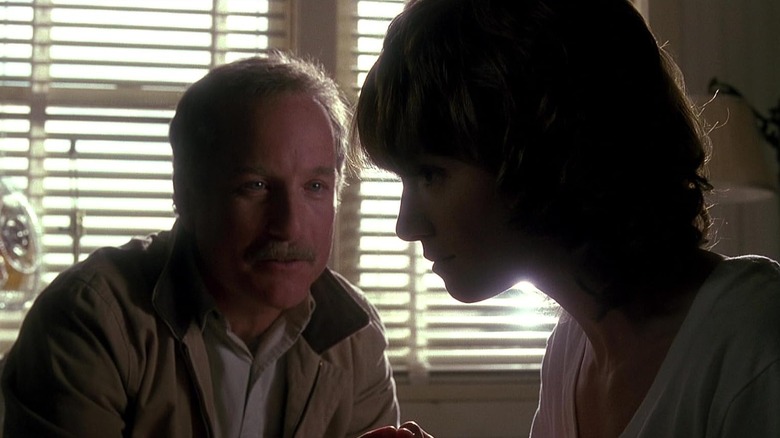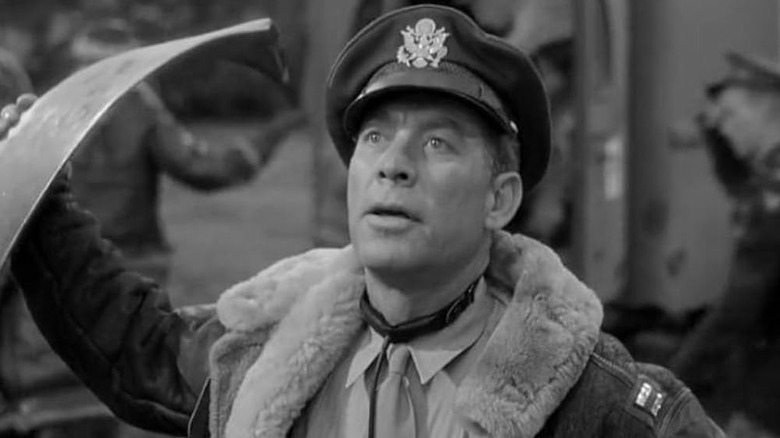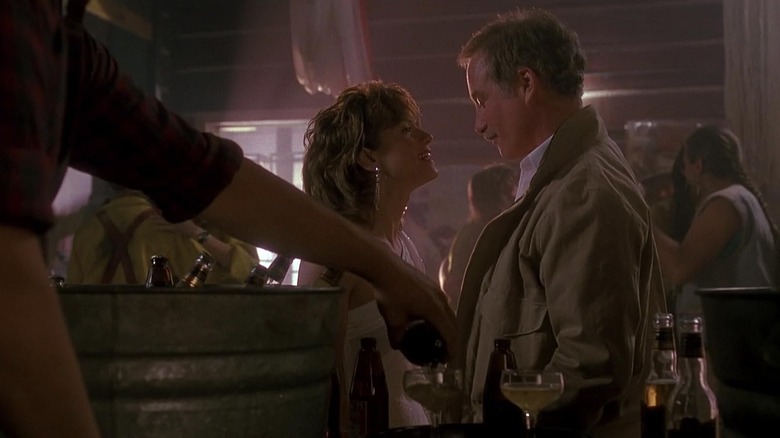Steven Spielberg's Always Is A Remake Of A Much Better War Movie
When it comes to Hollywood cinema, the 1980s was Steven Spielberg's decade. He was just about everywhere, making critically and commercially successful crowd-pleasers that also notched up Academy Award nominations ("Raiders of the Lost Ark," "E.T. the Extra-Terrestrial"), producing other box office hits like "Poltergeist," and founding Amblin Entertainment, a production company (itself named after a short film Spielberg once made) that churned out even more big moneymakers like "Gremlins" and "Back to the Future." Yet, for all his clout and undoubted artistic talent, there were still regular accusations of sentimentality. I tend to agree in some cases. I always preferred the more detached sense of wonder in "Close Encounters of the Third Kind" than the tear-jerking of "E.T;" and, while Spielberg's direction was good enough to land "The Color Purple" a Best Picture nod at the Oscars, I suspect it was his mawkish treatment of the source material that prevented it from winning. Sentimental Steve also struck again at the end of the decade with "Always," a saccharine remake of a much better war movie.
Updating Victor Fleming's 1943 classic "A Guy Named Joe" to a modern setting, "Always" stars Richard Dreyfuss as Pete Sandich, a cocksure fire-fighting pilot whose habit of riding his luck causes concern for his girlfriend Dorinda (Holly Hunter) and best pal Al (John Goodman). Their worst fears come to pass as Pete perishes in a forest fire after heroically saving Al's life, but that's not the end for Pete. In the afterlife, he meets Hap (Audrey Hepburn in her final film role), a spirit guide who sends him back as a guardian angel to trainee pilot Ted Baker (Brad Johnson). Much to Pete's dismay, Ted starts falling for Dorinda, but he must put his own feelings aside when Ted is called away on a deadly rescue mission.
"Always" must have seemed like a sure-fire winner. It came about due to Spielberg and Dreyfuss's mutual love for "A Guy Named Joe," as the pair floated the idea of remaking it while shooting "Jaws." The movie has a lot going for it even beyond that, including a solid cast (apart from Johnson's bland love rival) and Spielberg confidently handling the big set pieces. And though it still made money at the box office, the movie was ultimately too maudlin for its own good and is generally regarded as one of Spielberg's worst pictures. Let's take a closer look at the original film and where it all went wrong for "Always."
So, what happens in A Guy Named Joe?
Spencer Tracy stars in "A Guy Named Joe" as Pete Sandidge, an American flyer stationed in Britain during World War II who can't resist the urge to risk his life performing dangerous acts of heroism, constantly landing himself in hot water with his commanding officer, "Nails" Kilpatrick (James Gleason). But everything is sweet when he's on the ground because he's dating fellow pilot Dorinda Durston (Irene Dunne) and can always rely on his loyal friend Al Yackey (Ward Bond). After Nails punishes Pete by sending him and Al to Scotland on recon duty, Dorinda has a bad feeling and gives him an ultimatum: Return to the safety of the United States and train new pilots, or she'll take up a new post in Australia instead. Love wins over and Pete reluctantly agrees just before he's scrambled for one final mission to intercept a German aircraft carrier. During the operation, however, his "crate" is fatally damaged by an enemy fighter, forcing Pete to get his crew to safety before going on an inescapable run to bomb the ship.
Waking up in the afterlife, Pete is greeted by his old deceased friend Dick Rumney (Barry Nelson). With his guidance, The General (Lionel Barrymore) dispatches him to Earth to look over the shoulder of inexperienced pilots training for action overseas. Pete's candidate is Ted Randall (Van Johnson), a wealthy and charming young man with a penchant for corny chat-up lines. Shipped out to New Guinea, Ted gets to try his pick-up routine on Dorinda, who is now stationed on the island along with Al and Nails. They fall in love and Ted proposes, prompting Pete to get revenge by encouraging Ted to fly recklessly in the hope he will get busted by Nails. Nails has other ideas, though, and selects Ted for a very dangerous mission to destroy a Japanese ammunition dump.
Released four years after he delivered the double-whammy of "Gone with the Wind" and "The Wizard of Oz," "A Guy Named Joe" is another nailed-on classic from director Victor Fleming. The excellent cast make the most of Dalton Trumbo's screenplay, which delivers sparkling banter and inspiring speeches in equal measure. Although some contemporary critics found it distasteful when people were dying in combat, the film now stands alongside Powell and Pressburger's "A Matter of Life and Death" as a supernatural wartime romance that celebrates the vitality of life in a time of global conflict.
Why A Guy Named Joe succeeds where Always fails
A year before "A Guy Named Joe" premiered in New York, Rick Blaine (Humphrey Bogart) was standing on a foggy runway imploring Ilsa Lund (Ingrid Bergman) to get on a plane with her resistance leader husband, giving up their chance of happiness for the greater good in the fight against the Third Reich. There is a similar scene in the last reel of Victor Fleming's movie when Pete's celestial commanding officer gives him an inspiring speech, asking him to put aside his personal feelings for Dorinda and help the folks he left behind win the war.
Like "Casablanca," "A Guy Named Joe" strikes a similarly poignant note of propaganda. After the United States entered World War II, people all over the nation were waving goodbye to their loved ones, not knowing if they'd ever see them alive again. FIlms like this, which struck a deeply relatable note with their romantic storylines, assured audiences that the self-sacrifice was crucial if the Allies were to defeat the Axis Powers. As light-hearted and genial as "A Guy Named Joe" is, this feeling of uncertainty and mortality hangs over the entire movie. We're focused on three people and their hill of beans, but it gives you the larger sense that these personal stories are being played out all across every theater of war, with the possibility of death never far away.
That's where "Always" falls down. By updating the story and removing the wartime context, Steven Spielberg and his screenwriter Jerry Belson are guilty of shrinking the stakes. Sure, there are still lives hanging in the balance, but the drama feels more inconsequential without the backdrop of a global conflict. All the urgency is lost, and the movie eventually drifts away as Spielberg succumbs to his worst sentimental tendencies. You can't really blame the craft or the cast, because it's a beautifully made movie and the actors all do their bit, even if Richard Dreyfuss and Holly Hunter lack the prickly screwball chemistry of Spencer Tracy and Irene Dunne in the original. Ultimately, "Always" takes a beloved classic and makes it prettier and more lavish, but somehow ends up feeling far less than the sum of its parts.


